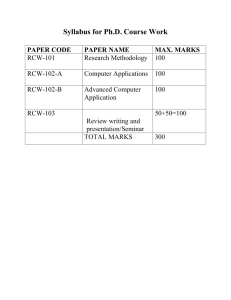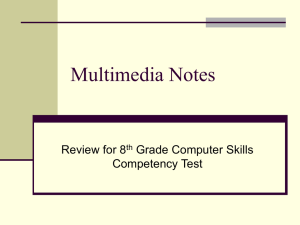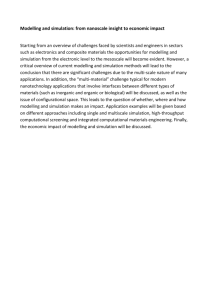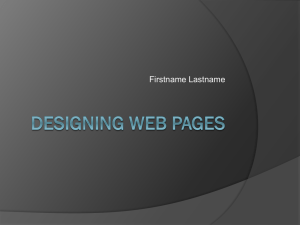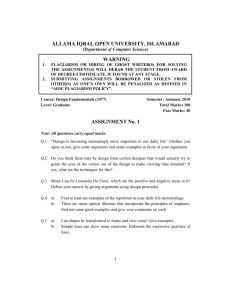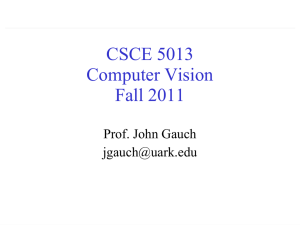- Rajshahi University Web Page
advertisement
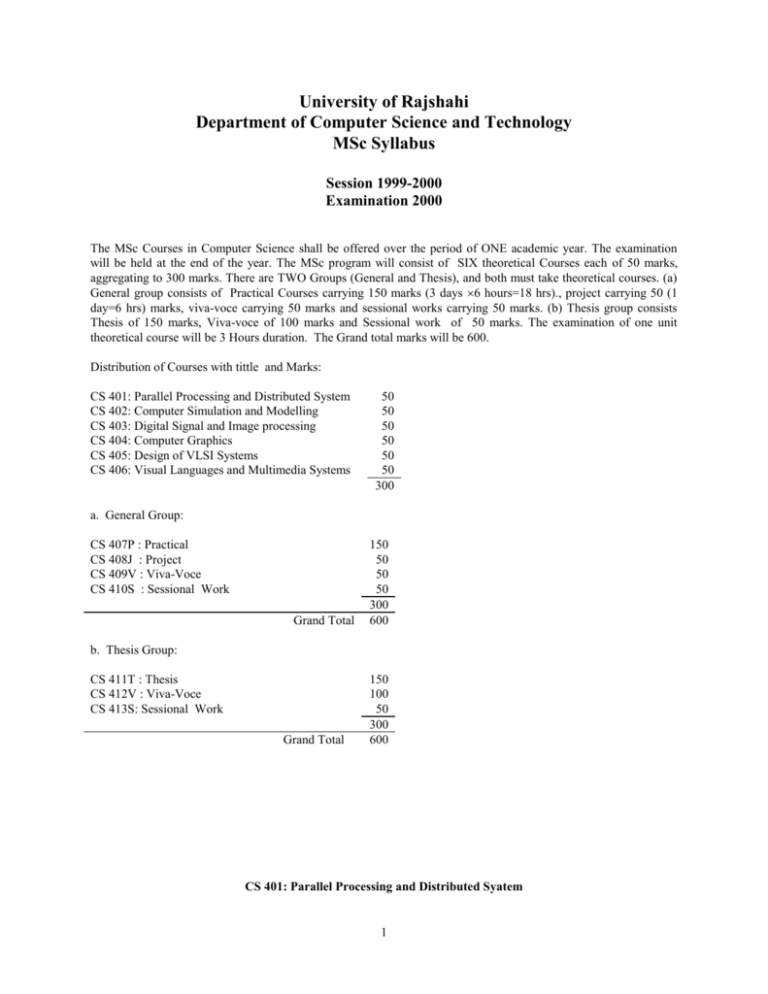
University of Rajshahi Department of Computer Science and Technology MSc Syllabus Session 1999-2000 Examination 2000 The MSc Courses in Computer Science shall be offered over the period of ONE academic year. The examination will be held at the end of the year. The MSc program will consist of SIX theoretical Courses each of 50 marks, aggregating to 300 marks. There are TWO Groups (General and Thesis), and both must take theoretical courses. (a) General group consists of Practical Courses carrying 150 marks (3 days 6 hours=18 hrs)., project carrying 50 (1 day=6 hrs) marks, viva-voce carrying 50 marks and sessional works carrying 50 marks. (b) Thesis group consists Thesis of 150 marks, Viva-voce of 100 marks and Sessional work of 50 marks. The examination of one unit theoretical course will be 3 Hours duration. The Grand total marks will be 600. Distribution of Courses with tittle and Marks: CS 401: Parallel Processing and Distributed System CS 402: Computer Simulation and Modelling CS 403: Digital Signal and Image processing CS 404: Computer Graphics CS 405: Design of VLSI Systems CS 406: Visual Languages and Multimedia Systems 50 50 50 50 50 50 300 a. General Group: CS 407P : Practical CS 408J : Project CS 409V : Viva-Voce CS 410S : Sessional Work Grand Total 150 50 50 50 300 600 b. Thesis Group: CS 411T : Thesis CS 412V : Viva-Voce CS 413S: Sessional Work Grand Total 150 100 50 300 600 CS 401: Parallel Processing and Distributed Syatem 1 Marks: 50 Introduction: Trends towards Parallel processing, Parallel processing mechanism, Multiprogramming and Time sharing, Parallel Computer Structures, Parallelism and Pipelining, Parallel processing applications, Speedup Performance Laws, Parallel Random Access Machines(PRAM) and VLSI model. Hardware Technology: Advanced processor Technology, Superscalar and Vector processor, Shared memory organization, Design of Linear and Non linear Pipeline processor, Multiprocessor System Interconnects. Pipelining and Vector Processing: Principles of Pipelining, Classification of pipelined processors, Instruction and Arithmetic pipeline design, Vector Processing principles, Vector processing requirements, Designing Pipelined processors, Compound Vector processing, Recent Vector processors, Vectorization and Optimization methods. Parallel Programming: Parallel Programming models, Parallel Languages and Compilers, Code Optimization and Scheduling, Loop Parallelization and Pipelining, Parallel Programming Environments, Shared-variable program structures, Mapping programs onto Multicomputers. Distributed Processing: Introduction, Function distribution, Hierarchical and Horizontal distributed system, Strategies for distributed data processing, Data distribution, Conflict analysis, Distributed Database and applications. Books Recommended 1 . 2 . 3 . 4 . Kai Hwang (Senior Consulting Edition) : Kai Hwang, Faye A. Briggs : Advanced Computer Architecture Parallelism, Scalability, Programmability Computer Architecture and Parallel Processing R. J. Cypser : Communication Architecture for distributed system James Martin : Design and Strategy for distributed data processing CS 402: Computer Simulation and Modelling Marks: 50 Simulation methods: Introduction to Simulation, Random number generator, analogue simulation of continuous system, Discrete system simulation, Simulation of a pert network, Statistical analysis of result, Validation and verification techniques, Application of simulation to problems e.g. business, operation research, operating system, Computer design, Introduction to simulation packages, Computer animation. Modelling :- Introduction to modelling techniques, Problems, models and systems, Modelling concepts, Logic for (conceptual) modelling, Logic programming for conceptual modelling, Concepts of relational modelling and its practice. Some practical modelling e.g. Relational Database modelling, Different methods for Curves and surface modelling, Fractals, Polyhedral modelling with Euler’s formula, Advanced modelling, Procedural models. Books Recommended 1. 2. J. A. Spriet R. S. Lehman : Computer Aided Modeling & Simulation. : Computer Simulation and Modeling. 2 3. 4. G. Cordon James D. Foley Andries van Dam : System Simulation. : Computer Graphics. CS 403: Digital Signal and Image Processing Marks: 50 Digital Signal Processing: Digital signal processing model, Discrete time signal and system, Discrete Fourier Transform (DFT),; Separability, Convolution and Correlation properties of DFT, Convolution theorem, Fast Fourier Transform (FFT), Z-Transform, Sampling theorem, Different types of window, Digital Filter design Fundamentals of Image processing: Digital Image representation, Elements of image processing system, Problems and Applications of image processing, Mathematical model of image, Image sampling and quantization, two dimensional image transformation, Binary and Gray level images, Photographic film. Image enhancement: Enhancement in spatial and frequency domains, Some simple Intensity transformations, Histogram equalization, Histogram specification, Image subtraction, Image average, Filtering in frequency domain. Image Analysis: Image compression- fundamentals and models, Image segmentation- edge detection, thresholding and region oriented segmentation, Morphological image processing. Image processing applications: Pattern recognition, Image processing on remote sensing data. Books Recommended 1. 2 3. Defatta Rafeal C. Gonzalez & Richard E. Woods Gordon E. Carlson : Digital Signal Processing : Digital Image Processing. : Signal and Linear system Analysis CS 404: Computer Graphics Marks: 50 Introduction: Overview on basic components of Computer Graphics, Graphics Input devices, Architecture of Graphics display devices, Video memory. Fundamental Graphics Algorithms: Scan Conversion of Points and Lines, Line drawing algorithm, DDA algorithm, Breseuham's Line algorithm, Loading the frame buffer, circle generating algorithm, Midpoint circle algorithm, Ellipse generating algorithm, Midpoint Ellipse algorithm, pixel addressing, Region Filling algorithms. Implementation of Computer Graphics: Co-ordinates Transformations, Two and Three dimensional Transformation, Viewing and Clipping, Projections, Curves and Surface Design, Elimination of Hidden surfaces, Z-buffer algorithm, Painters algorithm, Vector mathematics method, Raster graphics systems, Image synthesis methods, Ray tracing, Shadow mapping. Books Recommended 1. 2. 3. 4. Steven Haringtron Hearn and Baker F. S. Hill Plastock and Kalley : Computer Graphics a programming approach, Second Edition, 1987. : Computer Graphics. : Fundamentals of Computer Graphics. : Computer Graphics. 3 CS 405: Design of VLSI Systems Marks: 50 Design and analysis techniques for VLSI circuits. Design of reliable VLSI circuits, noise considerations, design and operatio of large fan-out and fan-in circuits, clocking methodologies, techniques for data path and data control design. Simulation techniques. Parallel processing, special purpose architecture's in VLSI. VLSI layouts partitioning and placement routine and writing in VLSI. Releability aspects of VLSI design, Introduction to VHDL. Introduction to Fault Tolerant Systems and Architecture. Books Recommended 1. 2. 3. 4. Basic VLSI design: System & Circuit R. K. Brayton et al. F. Lombardi C. A. Mead and L. A. Conway : K. Eshraghian & D. A. Pucknell - Prentice Hall : : : Logic Minimization Algorithems for VLSI Synthesis. Testing and diagnosable Design of VLSI and ULSI. Introduction to VLSI Systems. CS 406: Visual Languages and Multimedia Systems Marks: 50 Introduction:- Purposes of Visual language, Basic Components of Visual language, Interaction Techniques to the Visual language. Visual Basic: Basic Components and their Design techniques; Method, Event and Properties of each component, Interaction to other programs, Graphics and Animation, Windows Registry, Application Program Interface Technique (API), ActiveX control, Database Handling in Visual Basic. Visual C++: Windows programming technique using C++, Project construction, Uses of Microsoft Foundation Class (MFC). Hypertext Language: Web design and Implementation techniques, Web activation and addressing. Multimedia: General concept of Audio, Video, Sound, Text and Graphics, Structure and Organization of Multimedia, Multimedia Hardware, Digital Audio Technology, Multimedia Graphics and Animation, Digital Imaging Technology, Multimedia Software, Visual Communication, Multimedia and Internet, Multimedia project preparing, costing and distributing. Books Recommended 1. 2. 3. 4. 5. 6. 7. 8. 9. John Villamil-Casanova, Louis Molina John Villamil-Casanova, Louis Molina John Villamil-Casanova, Leony Fernandez-Elias Ivor Horton, Wrox Press Ltd. S. Gokul Tay Vaughan Evangelos Petroutsos John Villamil-Casanova, Louis Molina John Villamil-Casanova, Louis Molina : : : : : : : : : Multimedia. Production, Planning and Delivery Multimedia. An Introduction Multimedia. Graphics Begging Visual C++ 6 Multimedia Magic Multimedia Mastering Visual Basic 6 Multimedia Sound & Video Multimedia on WEB 4
